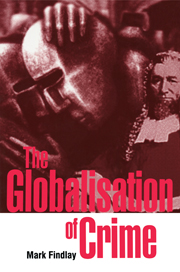Book contents
- Frontmatter
- Contents
- Preface
- Acknowledgements
- Introduction: Notions of context and globalisation
- 1 (Mis)representing crime
- 2 Crime and social development
- 3 Crime and social dysfunction
- 4 Marginalisation and crime relationships
- 5 Crime economies
- 6 Crime as choice
- 7 Integrating crime control
- Epilogue
- Bibliography
- Index
1 - (Mis)representing crime
Published online by Cambridge University Press: 22 September 2009
- Frontmatter
- Contents
- Preface
- Acknowledgements
- Introduction: Notions of context and globalisation
- 1 (Mis)representing crime
- 2 Crime and social development
- 3 Crime and social dysfunction
- 4 Marginalisation and crime relationships
- 5 Crime economies
- 6 Crime as choice
- 7 Integrating crime control
- Epilogue
- Bibliography
- Index
Summary
Crime trends
Late last century Durkheim (1984) proposed, and recent studies seem to confirm (Leavitt, 1992), that increases in the frequency of crime relate to social differentiation as a process of socio-cultural evolution. Put simply, the more artificially divided a society becomes as it develops, particularly as Durkheim saw it in terms of the structure and product of labour, the more common is crime. If this is so, then one might assume increased crime rates as a natural consequence of cultural modernisation or social diversification. Globalisation, therefore, may tend to stimulate or retard crime, depending on whether it is a force for harmony or dissonance. The difficulty with this or any other general assertion about trends in crime is the culturally specific nature of crime and the problems involved in revealing its social reality (see Quinney, 1970). These issues make reliance on crime trends little more than speculation.
Due to the paucity of useful crime data from most countries, it is impossible to generalise on long-term crime trends world-wide. Braithwaite suggests that ‘the only generalisation we can make about historical crime trends is one of a general [post-World War II] increase’ (1989: 50). There are ‘common-sense’ expectations regarding the rise and fall of crime rates during particular social periods. These include the assumption that theft increases during economic recession and high unemployment. Such assumptions undermine the cautions which must accompany crime trend analysis.
- Type
- Chapter
- Information
- The Globalisation of CrimeUnderstanding Transitional Relationships in Context, pp. 20 - 57Publisher: Cambridge University PressPrint publication year: 1999



